Demolition Contractors Dronfield
Top 10 Demolition Contractor in Dronfield
Get up to 3 Demolition Company Near Me quotes for your project today! Compare profiles, reviews, accreditations, portfolio, etc... and choose the best offer.
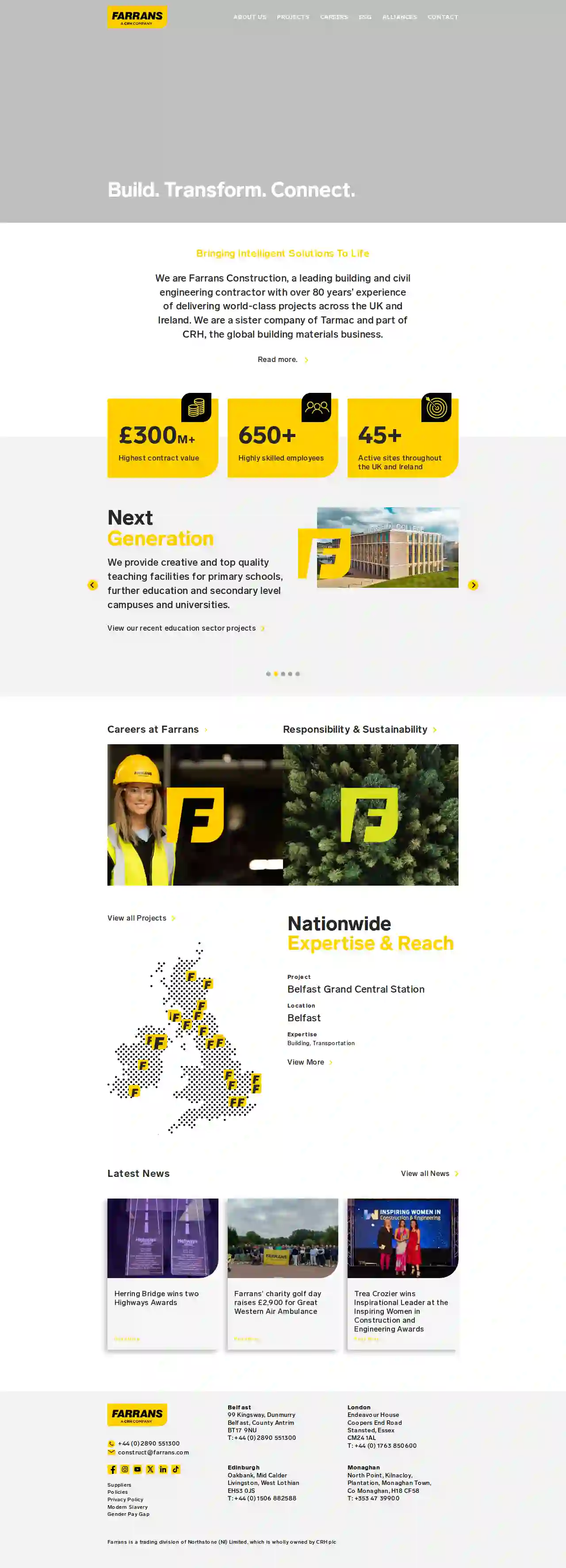
Farrans Construction
4.34 reviewsBelfast, County Antrim, 99 Kingsway, Dunmurry, BT17 9NU, GBBuild. Transform. Connect. Bringing Intelligent Solutions To Life We are Farrans Construction, a leading building and civil engineering contractor with over 80 years’ experience of delivering world-class projects across the UK and Ireland. We are a sister company of Tarmac and part of CRH, the global building materials business.
- Services
- Why Us?
- Gallery
Get Quote
GB Groundworks and Construction Ltd
44 reviews285 Ringinglow Rd, Sheffield, S11 7PZ, GBWelcome to GB Groundworks We are a small construction company with a focus on quality and delivering niche projects. Grounded in excavation and groundworks but with a family history of development we can offer the full package from breaking ground to completion in the commercial and domestic realms. We are experienced providers of solutions from design to final finish, incorporating piling, groundworks, foundations, extensions, new builds, landscaping, equestrian construction all completed with a high degree of skill and attention to detail. Commercially we’ve cut our teeth working in heavy industry factories installing machine bases, press pits, foundations and concrete tanks for production lines as well as welfare and Laboratory facilities. Domestically we undertake a diverse range of jobs from footings, drainage, landscaping, driveways, full extensions or just to damp packages, full new builds and more civil style works with retaining walls, rivers works, piling and concrete ring beams, fencing and basements. In the Equestrian field we work with domestic and commercial clients from menages, arenas stables, concrete yards, land drainage, fencing, field maintenance and more. We are currently having some email problems please use [email protected] to contact us.
- Services
- Why Us?
- Gallery
Get Quote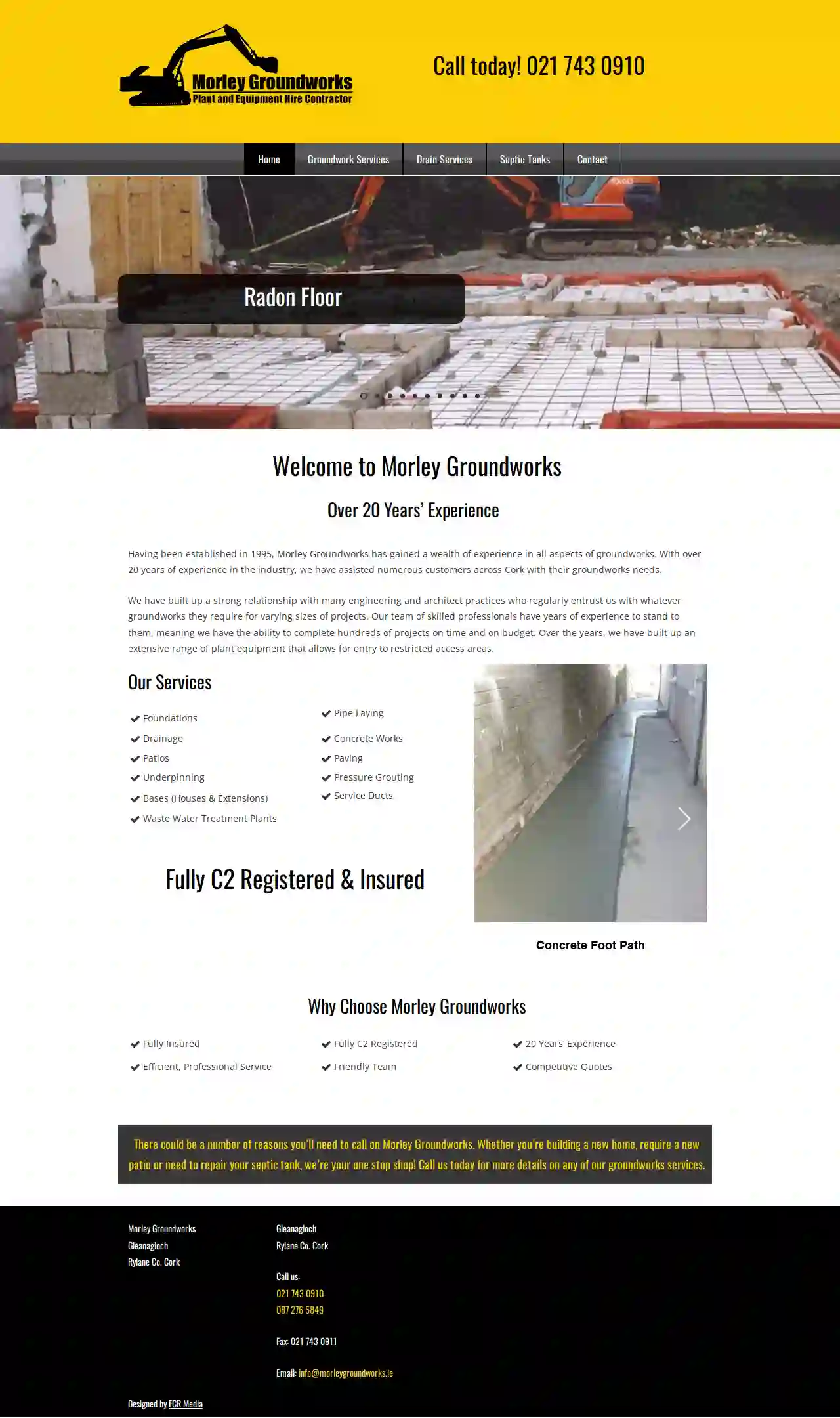
Morley Groundworks
51 reviewsGleanagloch, Rylane Co. Cork, GleanaglochRylane Co. Cork, Rylane, GBWelcome to Morley Groundworks Having been established in 1995, Morley Groundworks has gained a wealth of experience in all aspects of groundworks. With over 20 years of experience in the industry, we have assisted numerous customers across Cork with their groundworks needs. We have built up a strong relationship with many engineering and architect practices who regularly entrust us with whatever groundworks they require for varying sizes of projects. Our team of skilled professionals have years of experience to stand to them, meaning we have the ability to complete hundreds of projects on time and on budget. Over the years, we have built up an extensive range of plant equipment that allows for entry to restricted access areas.
- Services
- Why Us?
- Gallery
Get Quote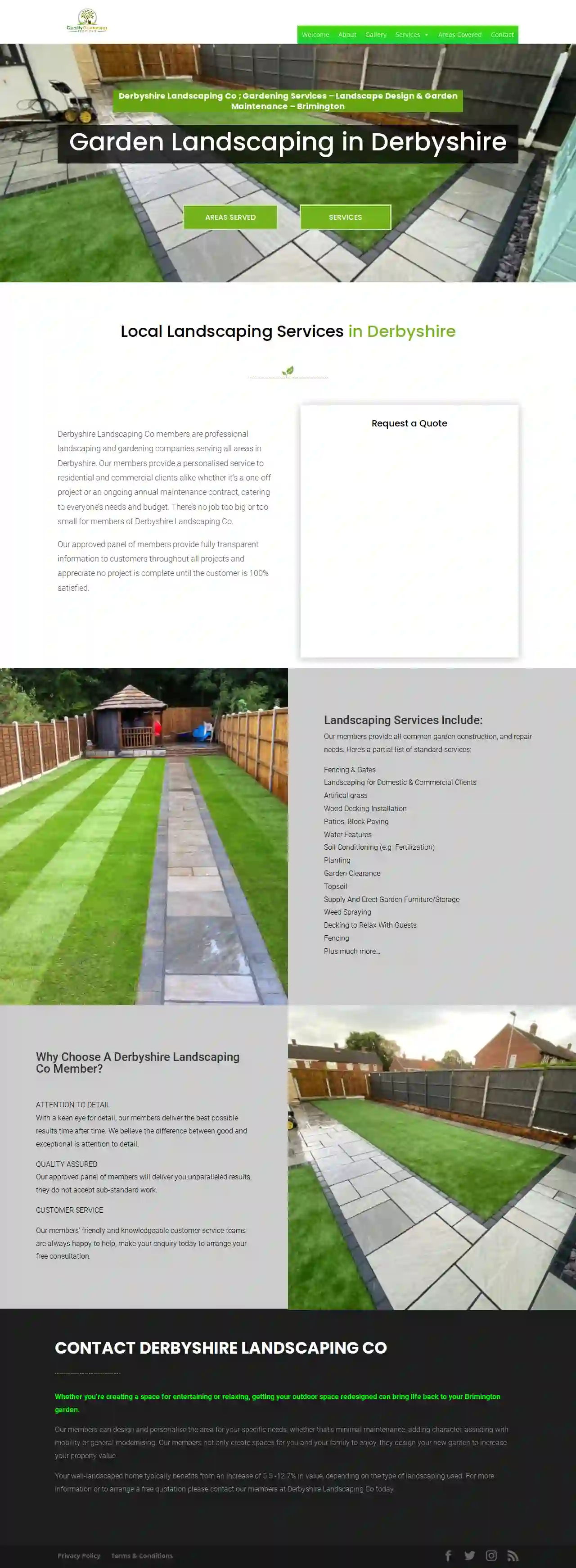
LA Landscaping Services LTD
Derby, GBDerbyshire Landscaping Co: Your Trusted Partner for Garden Transformation Derbyshire Landscaping Co is a network of professional landscaping and gardening companies serving all areas in Derbyshire. We are dedicated to providing personalized services to both residential and commercial clients, whether it's a one-off project or an ongoing annual maintenance contract. We cater to everyone's needs and budget, ensuring there's no job too big or too small for us. Our approved panel of members are committed to providing fully transparent information to customers throughout all projects. We believe in building trust and ensuring complete satisfaction, so no project is considered complete until you are 100% happy with the results. We understand that your outdoor space is an extension of your home, and we are passionate about creating beautiful and functional gardens that you can enjoy for years to come. Whether you're looking to create a space for entertaining, relaxing, or simply adding character to your property, our members can design and personalize the area to meet your specific needs. Our services include: • Fencing & Gates • Landscaping for Domestic & Commercial Clients • Artificial Grass • Wood Decking Installation • Patios, Block Paving • Water Features • Soil Conditioning (e.g., Fertilization) • Planting • Garden Clearance • Topsoil • Supply And Erect Garden Furniture/Storage • Weed Spraying • Decking to Relax With Guests • Fencing • Plus much more… Why Choose Derbyshire Landscaping Co? • **Attention to Detail:** Our members have a keen eye for detail, ensuring the best possible results time after time. We believe the difference between good and exceptional is attention to detail. • **Quality Assured:** Our approved panel of members will deliver unparalleled results, as they do not accept sub-standard work. • **Customer Service:** Our members' friendly and knowledgeable customer service teams are always happy to help. Make your enquiry today to arrange your free consultation. Investing in landscaping can significantly increase your property value. A well-landscaped home typically benefits from an increase of 5.5 - 12.7% in value, depending on the type of landscaping used. Contact our members at Derbyshire Landscaping Co today for more information or to arrange a free quotation.
- Services
- Why Us?
- Gallery
Get Quote
LOGICAL DEMOLITION LTD
7 Beighton Street, Sutton-In-Ashfield, Notts, Sutton-in-Ashfield, NG17 4EG, GBLogical Demolition: More Than Just Demolition Logical Demolition is a leading provider of demolition and construction services across the United Kingdom. We offer a comprehensive range of services, including demolition, refurbishment, soft strip, asbestos removal, specialist cutting services, temporary works, facade retention, and building works. We have many years of experience in all aspects of demolition and hazardous waste removal and disposal, and we pride ourselves on having a long list of satisfied customers. Our highly experienced team of demolition professionals are as happy working for private individuals as they are major companies. We are fully committed to safety and always work within the stringent regulations set for our industry. Our team is highly trained and certified, and we undertake both emergency and programmed demolition projects. We also carry out asbestos removal through our network of partners and sub-contractors. Prior to any demolition project commencing, we prepare a comprehensive method statement to address all risk elements and provide a method to work to. Our estimating team will identify the materials that can be reclaimed, recycled, re-used, and disposed of. They will calculate approximate tonnages or volumes of these materials and will provide costs and final destinations for them. As some reclaimed metals are very valuable, it is imperative that we achieve the best value for these as this is generally credited to clients. We are committed to providing our clients with the highest quality services and exceeding their expectations. Contact us today for a free site survey.
- Services
- Why Us?
- Gallery
Get Quote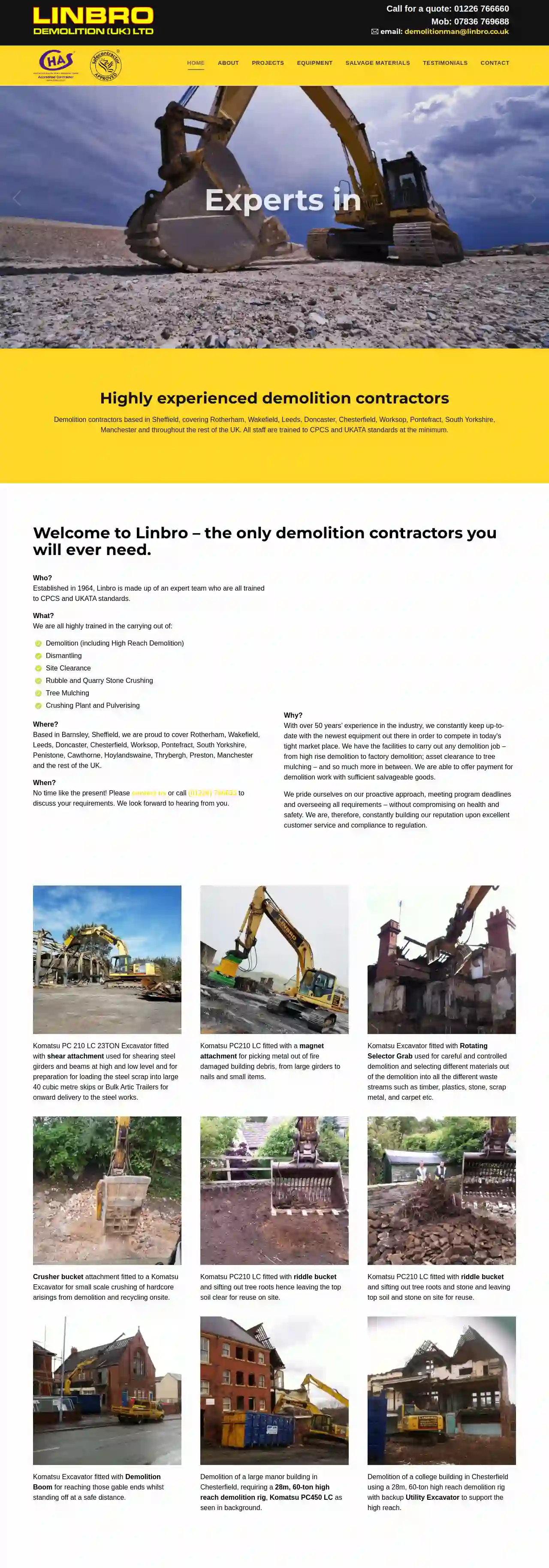
Linbro Demolition
4.127 reviewsHunger Hill Barn, Haigh Head Road, Haigh Lane, Hoylandswaine, Penistone, Sheffield, S36 7LY, GBLinbro Demolition: Your Trusted Partner for Demolition and Dismantling Established in 1964, Linbro Demolition has been a leading provider of demolition and dismantling services throughout the UK. We are a team of highly skilled and experienced professionals, all trained to CPCS and UKATA standards, ensuring the highest quality and safety in every project. We offer a comprehensive range of services, including: Demolition (including High Reach Demolition) Dismantling Site Clearance Rubble and Quarry Stone Crushing Tree Mulching Crushing Plant and Pulverising Our commitment to excellence extends beyond our services. We constantly invest in the latest equipment and technology to ensure we can handle any demolition project, from high-rise buildings to factories, asset clearance to tree mulching. We are also proud to offer payment for demolition work with sufficient salvageable goods. At Linbro, we prioritize safety and customer satisfaction. We are committed to meeting program deadlines and overseeing all requirements without compromising on health and safety. Our proactive approach and dedication to excellent customer service have earned us a reputation for reliability and professionalism. Contact us today to discuss your demolition needs. We look forward to hearing from you!
- Services
- Why Us?
- Testimonials
- Gallery
Get Quote
Express Paving Ltd
4.985 reviewsSheffield, GBExpress Paving Ltd Express Paving Ltd is one of South Yorkshires leading independent Patterned Imprinted Concrete Paving and Driveway specialists providing Sheffield driveway and patio installations. We first established our company in 2001 and have an excellent reputation for our outstanding professional workmanship and services. We can offer a personalise service to meet your needs and specification no matter how big or small the project for driveways, patios, garden renovations and more... Concrete Driveways and patio installations Elevate your outdoor space with Express Paving Ltd. Top-notch design, installation, and service. Boost your property's appeal today. We can offer a personalise service to meet your needs and specification no matter how big or small the project for driveways, patios, garden renovations and more... Our services include: Patterned imprinted concrete paving Driveway installations in Sheffield & Rotherham Driveway restoration and repairs Driveway cleaning and re-sealing Patio installation Concrete laying Concrete bases Groundwork preparations and excavations with our own grab hire service for waste removal in Sheffield. Service area We are based in Sheffield, and are able to serve a radius of 10 miles, Take a look at our service area on our about us page for more information. Our commitment to excellence has generated satisfied customers for many years. Since using google review platforms we have been able to give our customers the opportunity to share feedback. Discover why they choose Express Paving Ltd by reading our reviews.
- Services
- Why Us?
- Testimonials
- Gallery
Get Quote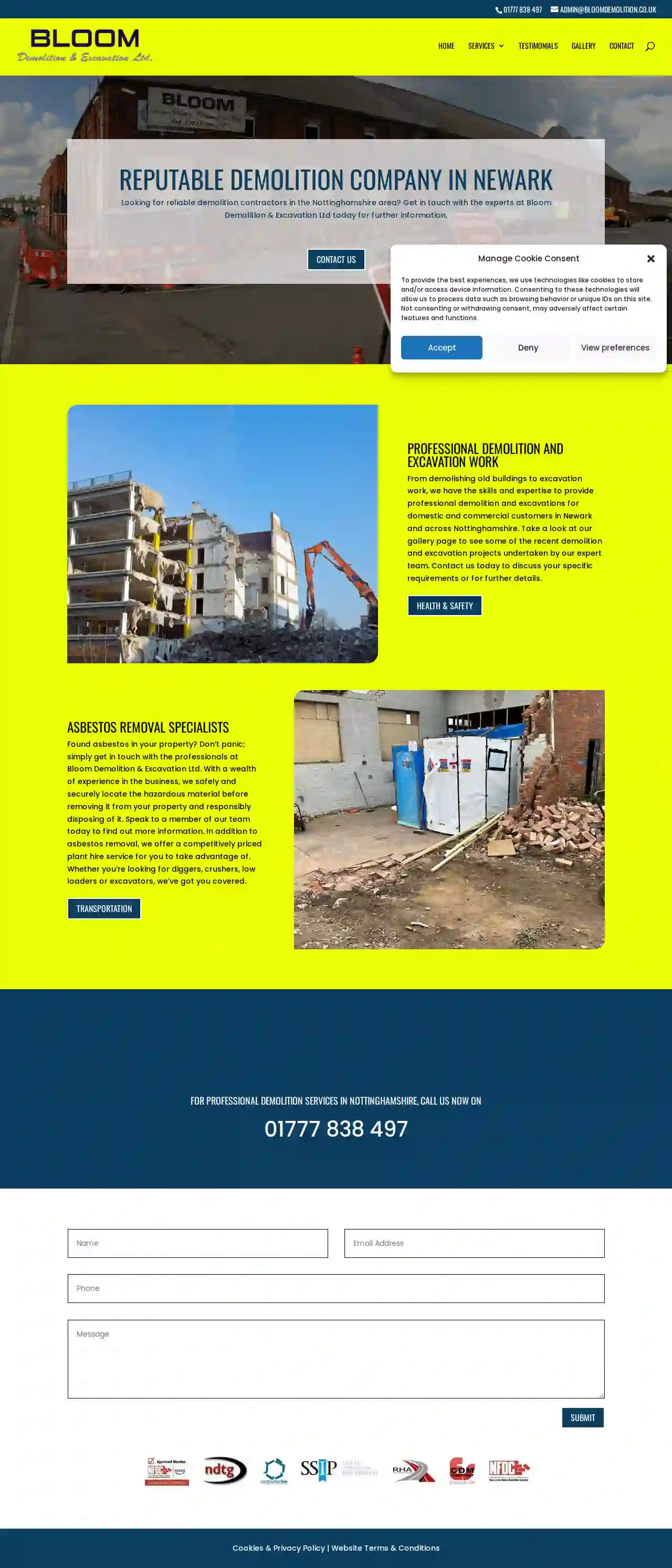
Bloom Demolition & Excavation Ltd
3.36 reviewsDerby, GBReputable demolition company in Newark Looking for reliable demolition contractors in the Nottinghamshire area? Get in touch with the experts at Bloom Demolition & Excavation Ltd today for further information. Professional demolition and excavation work From demolishing old buildings to excavation work, we have the skills and expertise to provide professional demolition and excavations for domestic and commercial customers in Newark and across Nottinghamshire. Take a look at our gallery page to see some of the recent demolition and excavation projects undertaken by our expert team. Contact us today to discuss your specific requirements or for further details. Health & safety Asbestos removal specialists Found asbestos in your property? Don’t panic; simply get in touch with the professionals at Bloom Demolition & Excavation Ltd. With a wealth of experience in the business, we safely and securely locate the hazardous material before removing it from your property and responsibly disposing of it. Speak to a member of our team today to find out more information. In addition to asbestos removal, we offer a competitively priced plant hire service for you to take advantage of. Whether you’re looking for diggers, crushers, low loaders or excavators, we’ve got you covered.
- Services
- Why Us?
- Gallery
Get Quote
Mini Digger & Dumper
51 reviewsRotherham, GBTake the strain out of garden groundworking in Rotherham with S&G Mini Digger Hire Whether you're looking for mini digger hire, a dump truck to get some heavy work done, or a chainsaw to clear trees on your property; if you're looking for great prices on ground works vehicle and machinery hire throughout the Rotherham and Sheffield areas you should call S&G today. Setting a high standard for vehicle hire We all want our homes and gardens to look their best, but getting them that way can be back-breaking work. From fantastic fencing or demolishing unwanted buildings in your garden, to manned or unmanned mini digger hire; S&G have many ways to take the hassle out of having a handsome garden. Losing your mind over leaks in your home? Leaks in your water system could be wasting hundreds of your hard-earned pounds every year without you even knowing. That's why S&G have been carrying out leak detection for homeowners in throughout Rotherham and Sheffield for over 35 years. Call us today to track down those costly leaks.
- Services
- Why Us?
- Gallery
Get Quote
Pickford Contracting Ltd
53 reviewsSledbrook Farm, Sheffield, S36 4HF, GBPickford Contracting Pickford Contracting is a local business based in Sheffield, offering a range of services to meet your needs. We are committed to providing high-quality workmanship and excellent customer service. Our Services We offer a wide range of services, including: General building work Extensions and conversions Renovations Landscaping And more! Our Team Our team of experienced and qualified professionals is dedicated to providing you with the best possible service. We are committed to working closely with you to ensure that your project is completed to your satisfaction. Contact Us If you are looking for a reliable and experienced contractor, please contact us today for a free quote.
- Services
- Why Us?
- Gallery
Get Quote
Over 13,059+ Excavation Contractors on our platform
Our excavation contractors operate in Dronfield and surrounding areas!
ExcavationHQ has curated and vetted Top Excavation Contractors near Dronfield. Find a top & trustworthy pro today.
Frequently Asked Questions About Demolition Contractors
- Site Security: Secure the demolition site with fencing and warning signs to prevent unauthorized access.
- Personal Protective Equipment (PPE): Workers should wear appropriate PPE, including hard hats, safety glasses, gloves, and steel-toe boots.
- Hazardous Material Removal: Properly identify and remove asbestos, lead paint, or other hazardous materials before demolition begins.
- Utility Disconnections: Disconnect all utilities, such as electricity, gas, and water, before demolition.
- Controlled Demolition Techniques: Employ controlled demolition methods to minimize risks and ensure the structure comes down safely.
- Dust Control: Implement dust suppression measures, such as water spraying or misting, to reduce airborne particles and protect air quality.
- Emergency Planning: Have an emergency plan in place, including communication protocols and evacuation procedures, in case of unforeseen events.
- Experience: Look for companies with a proven track record and years of experience in the demolition industry.
- Licensing and Insurance: Ensure the contractor is properly licensed to operate in your area and carries adequate insurance to protect you from liability.
- Safety Record: Inquire about their safety protocols and accident history. A reputable contractor prioritizes safety.
- References and Reviews: Ask for references from past clients and check online reviews to gauge their reputation and customer satisfaction.
- Professionalism: Choose a company that communicates clearly, provides detailed estimates, and has a courteous and responsive team.
What is the difference between demolition and deconstruction?
Demolition: Typically involves bringing down a structure quickly and efficiently, often using heavy machinery and potentially explosives. The primary goal is to clear the site.
Deconstruction: Focuses on carefully dismantling a building piece by piece to salvage reusable materials. It prioritizes minimizing waste and environmental impact, often involving manual labor and specialized tools.
The choice between demolition and deconstruction depends on the project's objectives, budget, and environmental considerations.
How can I tell if my building contains asbestos?
What are the safety precautions for demolition?
How do I find a reputable demolition contractor?
What is the difference between demolition and deconstruction?
Demolition: Typically involves bringing down a structure quickly and efficiently, often using heavy machinery and potentially explosives. The primary goal is to clear the site.
Deconstruction: Focuses on carefully dismantling a building piece by piece to salvage reusable materials. It prioritizes minimizing waste and environmental impact, often involving manual labor and specialized tools.
The choice between demolition and deconstruction depends on the project's objectives, budget, and environmental considerations.
How can I tell if my building contains asbestos?
What are the safety precautions for demolition?
- Site Security: Secure the demolition site with fencing and warning signs to prevent unauthorized access.
- Personal Protective Equipment (PPE): Workers should wear appropriate PPE, including hard hats, safety glasses, gloves, and steel-toe boots.
- Hazardous Material Removal: Properly identify and remove asbestos, lead paint, or other hazardous materials before demolition begins.
- Utility Disconnections: Disconnect all utilities, such as electricity, gas, and water, before demolition.
- Controlled Demolition Techniques: Employ controlled demolition methods to minimize risks and ensure the structure comes down safely.
- Dust Control: Implement dust suppression measures, such as water spraying or misting, to reduce airborne particles and protect air quality.
- Emergency Planning: Have an emergency plan in place, including communication protocols and evacuation procedures, in case of unforeseen events.
How do I find a reputable demolition contractor?
- Experience: Look for companies with a proven track record and years of experience in the demolition industry.
- Licensing and Insurance: Ensure the contractor is properly licensed to operate in your area and carries adequate insurance to protect you from liability.
- Safety Record: Inquire about their safety protocols and accident history. A reputable contractor prioritizes safety.
- References and Reviews: Ask for references from past clients and check online reviews to gauge their reputation and customer satisfaction.
- Professionalism: Choose a company that communicates clearly, provides detailed estimates, and has a courteous and responsive team.